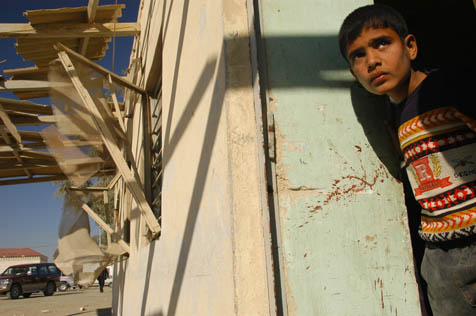Talk and Awe at UCSB
War Photog Ashley Gilbertson Relates Experiences in Iraq

As the lights dimmed in UCSB’s Campbell Hall last night, those in attendance were abruptly hushed by the image of the corpse of an Iraqi man marinating in blood. The shocking still is one of over 200 vivid moments captured by Ashley Gilbertson, who came to lecture at UCSB as part of its Arts & Lectures program.
Whiskey Tango Foxtrot – an oft-abbreviated phrase that reflects a war that, like UCSB, is famous for its invention of abbreviations and acronyms – is the recently released book of photographs and anecdotes from Gilbertson, a war photographer. “Iraq is like a drug,” admitted Gilbertson, 29, has made over 11 trips to Iraq since 2002 and has seen brutality of war and the results of the American invasion first hand. Working at first as a freelance photographer and later for publications like Time, Newsweek, and The New York Times, Gilbertson’s stunning work eventually earned him the prestigious Robert Capa Gold Medal Award in 2004.
Gilbertson, an Australian, said the most revealing aspect of the war for him is that he learned more about Americans in Iraq than he does in America. His photographs and his lecture communicated a bond he inadvertently forged with the soldiers he met through their mutual suffering and the lasting effects of combat. He decried the lack of media coverage on the war saying, “Our greatest failure is that we haven’t been able to actually show how bad it is.” Gilbertson spoke of his own maturation from a 21-year-old reckless and inexperienced photographer to a married man sobered by the carnage he witnessed. Similarly through the years his views on the war shifted from one of reluctant approval to total abhorrence.
Relating his experiences with the tragic lives of Iraqi civilians to previous work with Kosovo refugees, Gilbertson expressed disbelief that humans are capable of committing such atrocities. His ultimate goal for the book, he says, is “to open a discussion that isn’t political but humanitarian.” History holds numerous examples of photographs that helped to shape our view of the world; Gilbertson’s book may very well contain the images that define the conflict in Iraq for future generations.



